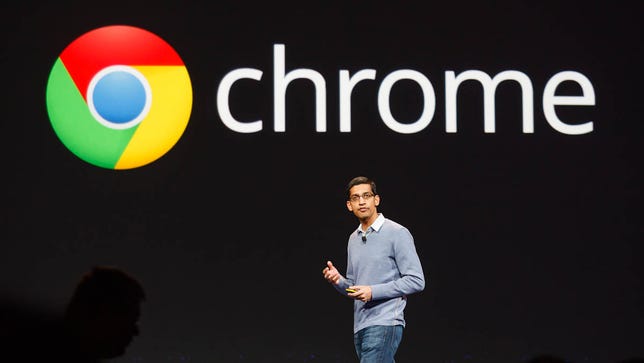Google’s Android operating system for mobile devices has gained significant traction in the market. Will Google follow this success up by pushing the OS into more sophisticated computing devices? Or will it use its browser based-OS Chrome to take on Apple and Microsoft in the PC software market?

These are the questions I tackle in this edition of Ask Maggie. I also offer some perspective on why it’s still important to choose a wireless based on network performance and reliability.
Googles big strategic decision: Android or Chrome
Dear Maggie,
I was at Google I/O this year, and I saw a lot of developers using Macs. As a hardcore Google/Android fan, this bothered me. I was wondering if you think Google is going to move into the PC operating system market with its own suave version of Android OS and take on Microsoft Windows and Apple Mac OS that way? If an Android PC comes out, I’ll be the first to buy it. So is there any chance of a Nexus PC coming in the near future? Please tell me there is!
Yours truly,
G-man
Dear G-man,
This is a great question. The short answer is that I wouldn’t hold my breath for a Nexus PC.
To dig deeper into this topic, I went straight to the experts. I sent your question via e-mail to CNET’s OS-guru Stephen Shankland. And I asked Seth Rosenblatt CNET Reviews’ expert on all things software to help me answer your question.


Stephen Shankland/CNET
The three of us attended Google I/O this year as well. And we were having a conversation during I/O about this very issue. How long will Google continue to develop the Android mobile OS and the Chrome OS separately? Will the two ever collide? Will one software OS eventually fade away?
Here’s what Stephen had to say:
I think Google wants to take on Windows and Mac OS X — but with Chrome OS, not with Android. Chrome OS is Google’s browser-based operating system, which means it only runs Web apps and loads Web pages. If you’re deep into the Google world — Google Drive, Gmail, Google Docs, Picasa Web Albums, and so on, that’s fine, though even diehard cloud-computing fans might well find they miss Photoshop, Diablo III, TurboTax, Microsoft Office, and other native apps.
Google hopes to address these shortcomings with a variety of technologies, including Native Client, the Dart programming language, and most recently, Chrome packaged apps, which aim to let browser-based apps take on another collection of abilities previously reserved for native Windows and Mac apps.
It’s a very interesting combination of technologies, and Google gets to piggyback on the immense popularity of the Web itself, which remains a tremendously important foundation for computing. But in order for Chrome OS to fulfill all its possibilities, Google will have to convince a lot of programmers to adopt the programming technologies that go beyond the ordinary Web. Expect that to take years — especially since those technologies won’t become standard unless other browser makers jump aboard.
If you don’t want to wait for Chrome OS to become real, some of Google’s Android partners are keen on making what amount to Android PCs. Asus, with its Transformer Prime line, is probably at the front of the list here. You get a tablet and, if you pay extra, a detachable keyboard, too. Unfortunately, you’ll have to wait here, too, because the combination isn’t yet ready to take on what a regular PC can do. There’s an awful lot of Android programming momentum, but not too much of it is aimed at tablets right now. That might change (I expect it to, gradually), but right now it’s certainly nothing I’d call suave. Android might grow up into a PC operating system, but I think Google will push Chrome OS that direction first.
Related stories
- Faster Chromebooks unshackle Chrome OS: Hands-on
- Samsung Chromebox Series 3 (Review)
- FCC approves controversial data roaming rules
Seth Rosenblatt agreed with Stephen for the most part. He said there are ways to make Android operate on hardware that is more like a laptop. But he’s not convinced that Google will develop this further and ever make the software available for laptops.
There’s Motorola’s Webtop dock for some phones that turns them into PCesque devices, but Android is more for allowing control of non-traditional computers, and Chrome OS is the “traditional” competitor. The slow pace at which Chrome moved to Android indicates that Google is comfortable (for now) allowing Android and Chrome to develop separately. We might see at some point down the line Google invest in a company like BlueStacks, which “plays” native Android apps on Windows and Mac, but it’s not likely anytime soon.
The bottom line is that when Google challenges Microsoft or Apple on the traditional computing OS battlefield, it won’t likely be armed with Android. The company’s plan seems to be to develop the browser-based Chrome for that task. So sadly you won’t be seeing a Nexus PC anytime soon. That said, you may want to check out the Samsung Chromebox that you likely got as a free gift from Google for attending I/O this year.
While most people have focused all their attention recently on the Android Nexus 7 tablet that was given away, the Chromebox computer was also a worthy piece of gear. Chromebox runs Google’s Chrome OS. And the specs for the device include an Intel Celeron dual-core processor clocked at 1.9Ghz, 4GB of RAM, and 16GB of local storage, plus a whole a bunch of connectivity options including six USB ports, two DisplayPorts, DVI, Ethernet, and Wi-Fi.
The box still isn’t able to do everything a Windows or Mac machine can do, but it is designed to offer access to all kinds of multimedia and Google’s cloud-based services. As a result, it’s got very limited storage. Anyway, it’s worth checking out and playing around with.
I hope I was able to answer your question with the help of my colleagues Stephen and Seth. Thanks for reading Ask Maggie!
A look at Samsung’s Series 3 Chromebox (pictures)






+3 more
Does network coverage still matter?
Dear Maggie,
Here’s a quick question that might make good fodder for your column. I’m about to retire in August, and I currently subscribe to Verizon Wireless service. The reason I chose Verizon years ago was mostly because it had the best coverage in central Illinois. But in this day and age, does it still really matter which carrier you use anymore? Don’t all the big players offer coverage in the same places?
My question to you is: Is it really important to consider coverage as a deciding factor for my service, or should I be looking at price? I might be willing to change carriers to save some money. What should my evaluation strategy be?
Thanks,
Glenn
Dear Glenn,
Service coverage is still very important. So I’d say that is still your top priority in evaluating a service provider.


Verizon Wireless
While some areas of the country get great service from all four of the major U.S. carriers, there are still plenty of places where service is limited because there is no coverage. Just last week when I was visiting my family at the beach in Delaware, I practically had to stand in the middle of the road to pick up a signal for a 3G wireless aircard on Sprint’s network. Meanwhile, the 4G LTE Samsung Galaxy S III phone I’ve been testing from AT&T worked perfectly well and even seemed to pick up a 4G signal.
As wireless subscribers rely more and more on data services, I’d argue that coverage will soon become an even more important issue. While bigger carriers are required to provide voice roaming to competitors at reasonable rates, they have not always been forced to offer roaming for 3G or even 4G data services.
The FCC passed rules in April 2011 that require wireless operators that own their infrastructure and spectrum to “offer data roaming arrangements to other such providers on commercially reasonable terms and conditions, subject to certain limitations.”
But Verizon Wireless is currently suing the FCC over those rules. The carrier argues that it shouldn’t be mandated by the government to enter into these roaming agreements. The company argues that it already partners with companies to provide roaming onto its data networks.
Verizon’s top Washington, D.C. advocate, Tom Tauke, said when the rules were adopted that the FCC’s “action represents a new level of unwarranted government intervention in the wireless marketplace. By forcing carriers that have invested in wireless infrastructure to make those networks available to competitors that avoid this investment, at a price ultimately determined by the FCC, discourages network investment in less profitable areas.”
But Steve Berry of the Rural Cellular Association said that without the FCC requiring such access to roaming agreements, the bigger carriers simply shut out smaller carriers. There are dozens of smaller carriers in the market who cannot get roaming agreements for data services with the two biggest wireless operators: AT&T and Verizon, he said during a recent interview.
What this means for consumers is that the near ubiquitous coverage you may have enjoyed with voice services offered by many competitors in a given market won’t be available for data services.
And without service, you might as well use your phone as a paperweight instead of as mobile phone. Without network connectivity for voice and data your expensive smartphone is useless.
So my recommendation is that you still consider network coverage and reliability as the first priority in your search for a cell phone carrier. You can check out service coverage maps, but I’d also recommend talking to friends and family with different service providers. See what they think of their service.
Once you’ve determined which carriers operate well in your area, then you can start comparing the price of the service plans. Verizon charges a premium for its service because it can. It has the largest footprint of any other wireless carrier in the U.S., and it’s considered to have one of the most reliable wireless networks. And that’s why it can afford to be less flexible than other providers and charge customers more.
I hope this advice was useful. Good luck in finding a new service provider.


Now playing:
Watch this:
The frenzy over shared data plans
3:13
Ask Maggie is an advice column that answers readers’ wireless and broadband questions. The column now appears twice a week on CNET offering readers a double dosage of Ask Maggie’s advice. If you have a question, I’d love to hear from you. Please send me an e-mail at maggie dot reardon at cbs dot com. And please put “Ask Maggie” in the subject header. You can also follow me on Facebook on my Ask Maggie page.



